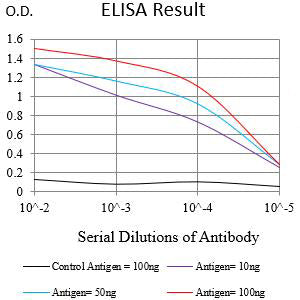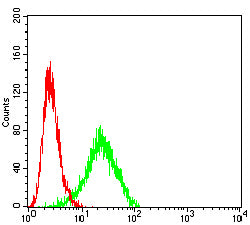

| WB | 咨询技术 | Human,Mouse,Rat |
| IF | 咨询技术 | Human,Mouse,Rat |
| IHC | 咨询技术 | Human,Mouse,Rat |
| ICC | 技术咨询 | Human,Mouse,Rat |
| FCM | 1/200 - 1/400 | Human,Mouse,Rat |
| Elisa | 1/10000 | Human,Mouse,Rat |
| Aliases | PRO232 |
| Entrez GeneID | 8000 |
| clone | 3F4E4 |
| WB Predicted band size | 12kDa |
| Host/Isotype | Mouse IgG1 |
| Antibody Type | Primary antibody |
| Storage | Store at 4°C short term. Aliquot and store at -20°C long term. Avoid freeze/thaw cycles. |
| Species Reactivity | Human |
| Immunogen | Purified recombinant fragment of human PSCA (AA: 1-114) expressed in E. Coli. |
| Formulation | Purified antibody in PBS with 0.05% sodium azide |
+ +
以下是关于PSCA抗体的3篇代表性文献(信息精简概括):
1. **文献名称**:*Therapeutic targeting of prostate cancer with a monoclonal antibody to PSCA*
**作者**:Reiter RE等
**摘要**:该研究开发了一种靶向PSCA的单克隆抗体(mAb 1G8),证明其能在前列腺癌异种移植模型中通过抗体依赖性细胞毒性(ADCC)抑制肿瘤生长,为PSCA抗体在免疫治疗中的应用提供实验依据。
2. **文献名称**:*Prostate stem cell antigen (PSCA) antibody-drug conjugate for metastatic castration-resistant prostate cancer*
**作者**:Petrioli R等
**摘要**:探讨PSCA抗体偶联药物(ADC)在转移性去势抵抗性前列腺癌中的潜力,通过将抗体与细胞毒性药物结合,实现靶向杀伤肿瘤细胞,并评估其临床前安全性和有效性。
3. **文献名称**:*PSCA as a tissue and urinary biomarker for prostate cancer risk stratification*
**作者**:Han KR等
**摘要**:研究PSCA在组织样本和尿液中的表达水平与前列腺癌分期、侵袭性的相关性,提出PSCA抗体用于液体活检和病理分层的诊断价值,可能辅助临床决策。
注:如需具体文献年份或期刊信息,可进一步补充关键词(如研究领域或年份)缩小范围。
The prostate stem cell antigen (PSCA) is a glycosylphosphatidylinositol (GPI)-anchored cell surface protein belonging to the Ly-6/Thy-1 family. Initially identified in prostate epithelial cells, PSCA is overexpressed in various cancers, including prostate, bladder, pancreatic, and gastric cancers, while showing limited expression in normal tissues. Its role in tumorigenesis involves promoting cell proliferation, survival, and metastasis through interactions with signaling pathways like Wnt and EGFR.
PSCA has emerged as a promising therapeutic target due to its cancer-specific expression profile. Monoclonal antibodies targeting PSCA are designed to block its oncogenic functions or deliver cytotoxic payloads directly to tumor cells. Preclinical studies demonstrate that anti-PSCA antibodies inhibit tumor growth in xenograft models, either alone or as antibody-drug conjugates (ADCs). Additionally, PSCA-targeted CAR-T cells and bispecific antibodies are under investigation for immunotherapy applications.
Clinical trials evaluating PSCA-targeted therapies, such as AGS-PSCA (a monoclonal antibody) and PSCA-CAR T cells, are ongoing, with early-phase studies showing tolerability and preliminary efficacy. However, challenges like tumor heterogeneity, antigen escape, and on-target/off-tumor toxicity require further optimization. Research continues to explore PSCA's biological mechanisms, biomarker potential, and combinatorial strategies to enhance therapeutic outcomes in solid malignancies.
×